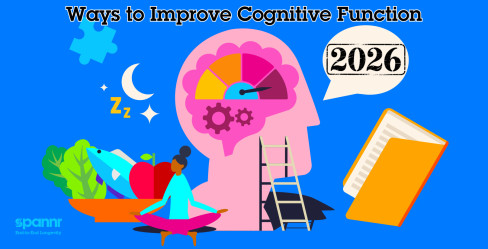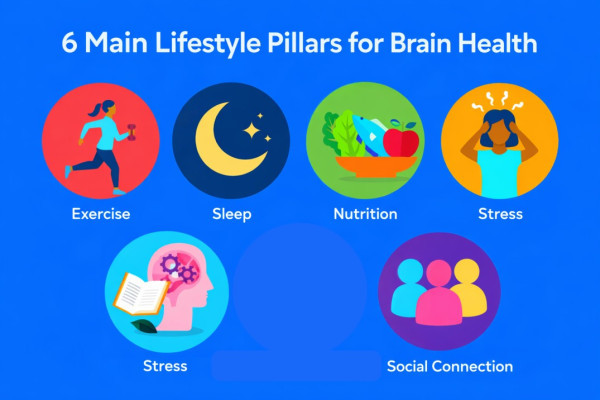10 Ways to Improve Cognitive Function

By Brent | Last Updated: March 10th, 2026
How Can You Improve Cognitive Function as You Age?
Cognitive decline isn't an inevitable straight line, but the odds do rise with age. Dementia is projected to affect more than 13 million people in the U.S. by 2050, which is why prevention and risk reduction matter now—not "someday" (CDC).
The encouraging part is that a meaningful chunk of dementia risk appears tied to modifiable factors. A major report estimated roughly 40% of dementia cases worldwide may be attributable to risk factors we can influence (The Lancet Commission). That's not a promise. It's leverage.
This guide focuses on practical, evidence-aligned ways to protect cognitive function. No miracle pills. No weird "biohacks" required.
Key Takeaways
> Roughly 40% of dementia cases may be linked to modifiable risk factors.
> The most powerful levers are exercise, sleep, nutrition, stress management, and social connection.
> Cognitive engagement (learning new skills, languages, reading) supports brain resilience.
> Supplements are secondary to lifestyle fundamentals.
> Consistency across multiple factors matters more than perfection in any single one.
Why Does Cognitive Function Decline with Age?
Aging is the strongest known risk factor for Alzheimer's disease and many other dementias (National Institute on Aging). That's the reality.
But "age" is also a bundle of processes that stack over time: vascular changes, inflammation, sleep disruption, stress exposure, and less movement, learning, and social contact than we had earlier in life. Those factors are where a lot of the opportunity lives.
This matters because dementia risk isn't only about memory. It's also about the systems that support memory: blood flow, metabolic health, sleep quality, and mental stimulation. If those systems stay strong, your brain has a better shot at staying resilient longer.
Understanding neurodegeneration helps clarify why these lifestyle factors matter—they target the underlying processes that drive cognitive decline.
Quick Answer: The most evidence-backed ways to improve cognitive function are: regular exercise, quality sleep, Mediterranean/MIND-style nutrition, stress management, cognitive engagement (learning, reading), and social connection. Roughly 40% of dementia risk may be modifiable through lifestyle factors. Consistency across multiple habits matters more than perfection in any one area.
What Lifestyle Factors Actually Protect Your Brain?
You don't need to do ten things perfectly. You need a few things consistently.
These are the big buckets most strongly tied to cognitive outcomes in the research: physical activity, sleep, nutrition patterns, cognitive engagement, social connection, and stress management. Many of these show up repeatedly in large observational work and long-term studies.
> Regular physical activity is associated with a lower risk of cognitive decline and dementia (Neurology)
> Sleep disturbances and abnormal sleep duration are associated with increased dementia risk (PubMed)
That's the foundation. Now let's get specific.

1) Exercise: The Most Powerful Brain Booster
Exercise is a brain intervention in gym clothes.
When you move, your brain gets more blood flow and oxygen. Over time, regular physical activity is linked with lower risk of cognitive decline and dementia. That doesn't mean exercise makes you immune. It means it's one of the most reliable levers you can pull.
What to do:
> Aim for regular aerobic work plus basic strength training
> Make it sustainable—consistency beats intensity
> If you're new to exercise or have medical conditions, build gradually
For specific protocols, our guide on HIIT and longevity covers how high-intensity training affects brain health through BDNF and cardiovascular improvements.
2) Nutrition for Brain Longevity
Diet is long-term brain maintenance, not a short-term "brain boost."
Diet patterns associated with slower cognitive decline include Mediterranean, DASH, and MIND style eating. These patterns tend to overlap: more plants, more fiber, healthy fats, and fewer ultra-processed foods.
What to emphasize:
> Vegetables, legumes, and whole grains
> Fish and unsaturated fats (like olive oil)
> Enough protein to support muscle and metabolic health
If you want a simple rule: build most meals around real food that looks like food.
For a comprehensive breakdown, see our guide on longevity diet characteristics. Inflammation control through diet is particularly important for brain health.
3) Sleep and Cognitive Health
Sleep is when your brain runs "maintenance mode."
Sleep disturbances and abnormal sleep duration are associated with higher dementia risk. Poor sleep can also worsen attention, mood, and memory in the short term, which creates a nasty loop: you feel foggy, you stop doing the habits that protect cognition, and the fog sticks around.
What helps:
> Keep a consistent sleep schedule
> Reduce late caffeine and late-night screens
> Make your bedroom boring: dark, cool, quiet
> If you suspect sleep apnea or persistent insomnia, treat that as a medical priority
Our comprehensive guides on sleep and longevity and sleep optimization cover the research in detail. Sleep quality vs. quantity is also worth understanding—both matter for brain health.
4) Manage Stress Before It Manages You
Chronic stress doesn't just feel bad. It changes the brain.
Research links chronic stress with negative effects on memory and hippocampal volume. You don't need to eliminate stress. You need to stop marinating in it.
Practical options:
> Daily walking without your phone
> Breathwork or simple relaxation training
> Social connection (it's a stress buffer)
> Non-sleep deep rest (NSDR) protocols
For a deeper dive, our guide on stress and aging covers how chronic stress accelerates biological aging across multiple systems.
5) Meditate for Attention and Emotional Control
Meditation isn't mystical. It's attention training.
Meditation has been associated with changes in brain structure and function, including gray matter density and attention-related outcomes. It's not a cure for anything. It's a skill.
If you're starting:
> 5 minutes daily is enough to build the habit
> Use a timer. Sit. Breathe. Return when you drift.
> Apps can help, but aren't required
This pairs well with stress management strategies as part of a broader resilience approach.
6) Keep Learning: Classes, Skills, and "Beginner Brain"
Cognitive engagement is protective.
Mentally stimulating activities are linked to slower cognitive decline. Lifelong learning and engagement also support neuroplasticity (National Institute on Aging).
This is the part people miss: your brain likes challenge. Not overwhelm. Challenge.
Ideas that work:
> Take a course (online or in-person)
> Learn an instrument
> Do something technical you're bad at (at first)
> Read books on unfamiliar topics—see our longevity books recommendations
7) Learn a New Language
Language learning is a full-brain workout.
Speaking more than one language is associated with delayed dementia onset in some research. It's not guaranteed protection, but it's a strong form of cognitive engagement that hits memory, attention, and executive function at the same time.
Start small:
> 10 minutes a day with an app or tutor
> Focus on comprehension first, perfection later
> Pair with travel or cultural content to increase engagement
8) Read More, Scroll Less
Reading builds attention span, vocabulary, and mental flexibility. It also replaces passive stimulation with active processing.
No, you don't need to read 50 books a year. You need a steady diet of mentally demanding input that isn't designed to hijack your attention.
Practical approach:
> Replace 20 minutes of scrolling with reading
> Vary formats: books, long-form articles, audiobooks
> Challenge yourself with topics outside your expertise
For longevity-specific reading, check our curated longevity books guide. Longevity podcasts can also provide cognitive stimulation during commutes or workouts.
9) Brain Training and Puzzles: Helpful or Hype?
Puzzles can be useful, but they're not the whole game.
Cognitive stimulation is associated with slower decline. That said, "brain training apps" often improve performance on the tasks you practice. They may not always generalize to real life.
Use puzzles as a supplement:
> Crosswords, Sudoku, strategy games, chess
> Rotate challenges so your brain doesn't adapt and coast
> Social games (bridge, poker) add connection benefits
If you hate puzzles, skip them. Put that energy into learning skills, moving your body, and sleeping better.
10) Socialize Like It's Part of the Protocol
Social connection is cognitive protection with a human face.
Socially active older adults experience slower cognitive decline in observational research. Loneliness and isolation tend to amplify stress, reduce activity, and shrink your world. That combination is bad news for brain health.
Make it concrete:
> Weekly plans with someone you like
> Join a group that meets on a schedule
> Volunteering counts—a lot
This also connects to our guide on finding your tribe for longevity.
How Do These Cognitive Health Strategies Work Together?
These interventions work best in combination, not in isolation.
|
Priority |
Intervention |
Impact on Brain Health |
Difficulty |
|
🔴 High |
Regular exercise |
Blood flow, BDNF, neuroplasticity |
Moderate |
|
🔴 High |
Quality sleep |
Memory consolidation, brain cleanup |
Easy-Moderate |
|
🔴 High |
Mediterranean/MIND diet |
Inflammation, vascular health |
Moderate |
|
🟡 Medium |
Stress management |
Hippocampal protection |
Easy-Moderate |
|
🟡 Medium |
Cognitive engagement |
Neuroplasticity, reserve building |
Easy |
|
🟡 Medium |
Social connection |
Stress buffer, mental stimulation |
Variable |
|
🟢 Supportive |
Meditation |
Attention, emotional regulation |
Easy |
|
🟢 Supportive |
Language learning |
Multi-domain engagement |
Moderate-Hard |
|
🟢 Supportive |
Puzzles/games |
Targeted cognitive exercise |
Easy |
For a broader framework on how these fit into overall longevity, see our guide to longevity.
Supplements for Cognitive Function: What Works?
Supplements are the most marketed and the least universally reliable.
This article doesn't recommend specific supplements because the provided research focuses on lifestyle interventions and brain health risk factors, not supplement efficacy. If you're considering supplements, it's smarter to start by checking basics: nutrient adequacy, sleep quality, activity level, and medical issues that can mimic cognitive decline.
Our longevity supplements guide covers compounds with research behind them. NAD+ precursors are among the most studied for cellular health, though direct cognitive effects are still being researched.
If you do experiment:
> Work with your clinician
> Track one change at a time
> Don't let supplements replace the fundamentals
Consider blood panel testing to identify nutritional deficiencies that might affect cognition before reaching for supplements.
When Should You See a Doctor About Cognitive Changes?
Cognitive changes deserve medical attention when they:
> Interfere with daily functioning
> Represent a clear change from your baseline
> Progress noticeably over months
> Include confusion, personality changes, or safety concerns
A longevity-focused physician can help distinguish normal aging from concerning changes and recommend appropriate screening. Preventative MRI scans are increasingly used for early detection of brain changes.
FAQs about Cognitive Function
How can I improve my cognitive function naturally?
Start with the core levers: regular exercise, healthy dietary patterns, sleep quality, stress reduction, cognitive engagement, and social connection. These are repeatedly linked to better cognitive outcomes in long-term research (The Lancet Commission).
What foods are best for brain health?
Diet patterns like Mediterranean, DASH, and MIND are associated with slower cognitive decline. These patterns emphasize plants, fiber, healthy fats, and fewer ultra-processed foods. See our longevity diet guide for details.
Does exercise help with cognitive decline?
Yes. Regular physical activity is associated with reduced risk of cognitive decline and dementia. Both aerobic exercise and strength training appear beneficial.
What supplements improve cognitive function?
This article doesn't make supplement claims because the strongest evidence supports lifestyle interventions. Treat supplements as optional and secondary to fundamentals. See our supplements guide for research-backed options.
Can you reverse cognitive decline?
Some contributors to cognitive symptoms can be improved, especially when they're tied to sleep issues, stress, inactivity, or poor metabolic health. Dementia itself is complex and not currently curable, but risk reduction and slowing decline are meaningful targets.
Why does dementia risk rise with age?
Age is the strongest known risk factor for Alzheimer's disease. Aging also tends to increase exposure to vascular and metabolic risk factors that influence brain health.
Does learning new skills actually help your brain?
Yes. Mentally stimulating activities are linked to slower cognitive decline, and lifelong learning supports cognitive fitness and neuroplasticity.
Does being bilingual protect against dementia?
Bilingualism is associated with delayed dementia onset in some studies. It's not a guarantee, but it's a strong form of cognitive engagement.
Does socializing really matter for brain health?
Yes. Social engagement is linked to slower cognitive decline in older adults.
How does stress affect memory?
Chronic stress is linked to negative effects on memory and hippocampal volume. Managing stress is a key part of cognitive protection.
What's the most important thing I can do for brain health?
If you had to pick one, exercise has the strongest and most consistent evidence. But the real answer is consistency across multiple factors—the combination matters more than any single intervention.
The Lancet Commission - Dementia Prevention
National Institute on Aging - Alzheimer's Fact Sheet
Physical Activity and Cognitive Decline (Neurology)
Dietary Patterns and Cognitive Decline (PubMed)
Sleep and Dementia Risk (PubMed)
Chronic Stress and Memory (PubMed)
Brain Health and Cognitive Fitness (NIA)
Cognitive Stimulation and Decline (PubMed)
Bilingualism and Dementia Onset (PubMed)
Social Engagement and Cognitive Decline (PubMed)
Meditation and Brain Structure (PubMed Central)
About the Author
Sign Up For Our Newsletter
Weekly insights into the future of longevity
